In today’s interconnected world, finding accurate information about someone can be crucial, whether you’re reconnecting with an old friend, verifying a tenant’s background, or ensuring your online date is who they claim to be. This is where specialized USA people search engines come into play. These powerful platforms are designed to do much more than a simple Google search; they delve into billions of public records to provide a comprehensive picture of an individual.
What Exactly is a People Search Engine?
Unlike standard search engines that crawl the public web, a dedicated people search engine is a paid service that aggregates data from a vast array of verified sources. These sources include:
-
Public Government Records: (From federal, state, and county courts) Criminal records, marriage and divorce licenses, property deeds, business filings, and voter registrations.
-
Utility Records: Phone and address histories.
-
Data Broker Collections: Information from consumer and marketing databases.
-
Other Publicly Available Data: Social media profiles, online directories, and other digital footprints.
By compiling this data into a single, searchable interface, these engines act as a one-stop shop for due diligence and personal discovery.
What Can You Discover?
The depth of information available can be startling. With just a name, phone number, or address, you can typically uncover:
-
Contact Information: Current and previous addresses, landline and mobile phone numbers.
-
Basic Personal Details: Age, date of birth, and possible relatives and associates.
-
Criminal & Legal History: Access to criminal records, sex offender status, traffic violations, and other court documents.
-
Property and Assets: Homeownership details, estimated property value, and other assets.
-
Financial Insights: Bankruptcy filings, liens, and judgments (though not full credit data).
-
Online Presence: Known email addresses and linked social media profiles.
Top Use Cases: When is it Needed?
These tools are invaluable for a variety of legitimate purposes:
-
Reconnecting with Loved Ones: Finding lost family members, old friends, or former classmates.
-
Background Checks: Screening a potential tenant, a new neighbor, or someone you’ve started dating online.
-
Verifying Identities: Confirming the authenticity of a person you’re doing business with to avoid scams.
-
Address and Phone Lookups: Identifying unknown callers or verifying an address before sending important mail.
-
Genealogical Research: Building out your family tree and discovering ancestors.
Important Considerations: Ethics and the FCRA
It is critical to understand the legal and ethical boundaries of using these services.
-
Not for Employment or Credit Decisions: People search sites are not Consumer Reporting Agencies (CRAs) as defined by the Fair Credit Reporting Act (FCRA). This means the information they provide cannot legally be used for determining eligibility for employment, housing, credit, or insurance. Using them for such purposes is against the law.
-
Accuracy Varies: While these engines pull from official records, data can sometimes be outdated or incorrect. They should be used as a starting point for verification, not as an absolute source of truth.
-
Privacy and Opt-Out: Most reputable sites have clear privacy policies and provide individuals with instructions on how to opt-out and have their data removed from the platform.
How to Choose a Reputable Service
With many options available, look for a service that offers:
-
Transparent Pricing: Clear information on subscription plans or single-report costs.
-
Source Citations: Indicating where the information was obtained.
-
Easy Opt-Out Process: A clear path for individuals to control their data.
-
Positive User Reviews: A strong reputation for delivering accurate results.
-
Strong Data Security: Measures to protect the sensitive information being accessed.
Conclusion
Specialized people search engines are powerful tools that leverage public records to help individuals find and verify information quickly. They serve essential roles in personal discovery, safety, and due diligence. However, this power comes with a significant responsibility to use the information ethically and within the bounds of the law. By choosing a reputable service and understanding its limitations, you can effectively harness billions of records to find the answers you need searchusapeople.com.
